They started by simplifying the rules of Warhammer Fantasy Battle. By creating maps and tiles like they did with Space Hulk, they were able to help audiences learn about the nuances of dice-based gaming. Combat, magic, attacks, weapons, ranges defenses were easier to figure out on the one-inch tiles. Not to mention that players that didn't have the hobby tools; paints, brushes would be able to be immersed in the world that Games Workshop was presenting because the plastic miniatures they were provided were highly detailed. By using pre-printed tiles they were able to allow gamers to create infinite maps as well. Milton Bradley was able to help Games Workshop in a number of ways. They could get the system published quickly, in multiple languages and distributed around the world. Milton Bradley was able to keep publishing prices down because they had experience in producing large volumes of toys and games. When these toy manufacturers were combined with the highly-detailed sculpts coming from Citadel it was a match made in heaven.
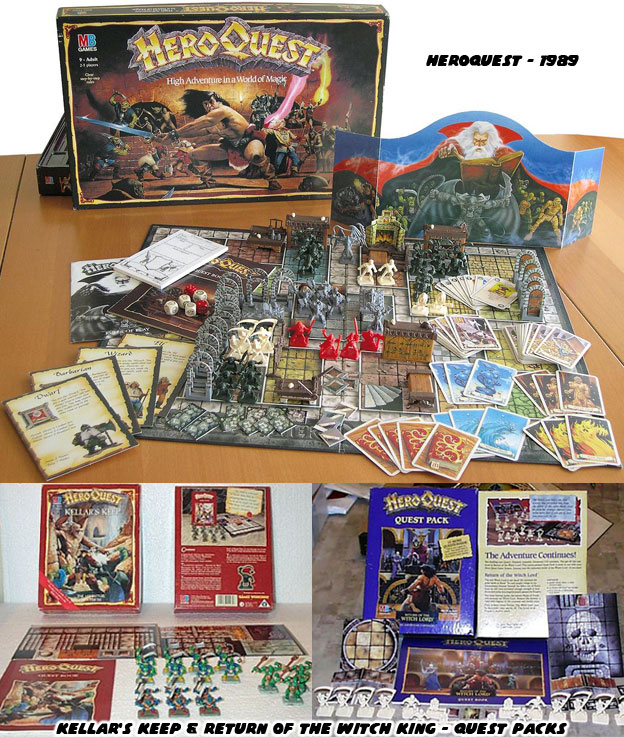
HeroQuest was a sensation. Audiences that were curious on fantasy gaming but didn't know where to begin could find HeroQuest in any toy store. It was right next to the other popular MB games Axis & Allies and Battleship. Some avoided Dungeons & Dragons because it had a certain social "nerd" stigma and required a healthy imagination and lots of free time. These were things that some people just couldn't commit to. There was an even larger portion of gamers that had never heard of the Warhammer Fantasy Battle system. They might be put off by learning that they had to paint and assemble their own models as well as had to buy all of the rules and codexes for each army. It could cost a few hundred dollars just to get up and running. Then there was the problem of finding another gamer in the community that also played Fantasy Battle. Games Workshop re-branded their tabletop miniatures system "3D Roleplay Hobby Games" so that audiences could tell it was much more than a simple board game. All of the rules and pieces were contained in the box. It didn't hurt that it was half the price of any similar game that Games Workshop had ever produced.
HeroQuest won several awards and gained a critical response from editors and gamers on the nascent web BBS. Word of mouth helped it sell copies in the pre-internet age. Games Workshop followed up the system with several expansions, each one more unique than the last. They added new magic, new characters, models to the system. It would have surprised inexperienced publishers how quickly Games Workshop was able to develop new scenarios and expansions that maintained a high level of quality. Those that were fans of the company knew the secret to their success was in adapting the Warhammer Fantasy universe little by little into HeroQuest. The villains of Chaos, the brave Elves and stubborn Dwarfs in the Warhammer style all made it into HeroQuest. Games Workshop had years worth of material that could become expansions for HeroQuest and actually did. Audiences that wanted to become more immersed in the world could even pick up Advanced HeroQuest.
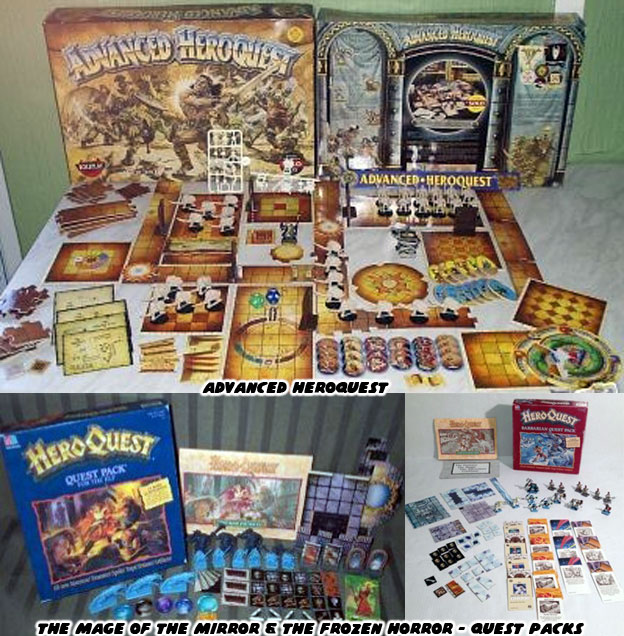
After seeing the success of HeroQuest Games Workshop wanted desperately to capture that success for Warhammer 40,000. Space Hulk was an exceptional game but it could only be found in some hobby stores. The studio needed to make something that Milton Bradley could help publish and distribute. They came up with Space Crusade, it was a primer to the Space Marines, Genestealers, Eldar and forces of Chaos. It was a fairly good introduction to science fiction tabletop gaming. Audiences could engage in firefights with all sorts of science fiction weaponry rather than the magic and sword battles in HeroQuest. What was interesting was that the robots used by Chaos in Space Crusade would eventually become the skeleton-like Necron robots in future revisions of 40K. Games Workshop had succeeded in getting on the shelves of the big retailers. Those in the US and around the world that had never heard of Games Workshop were suddenly very interested in these tabletop games. It had a ripple effect that helped sell tabletop games from other publishers. The quality of the Milton Bradley titles ended up being a bridge to the more serious systems. They were a great introduction to the world of Warhammer Fantasy and Warhammer 40,000.
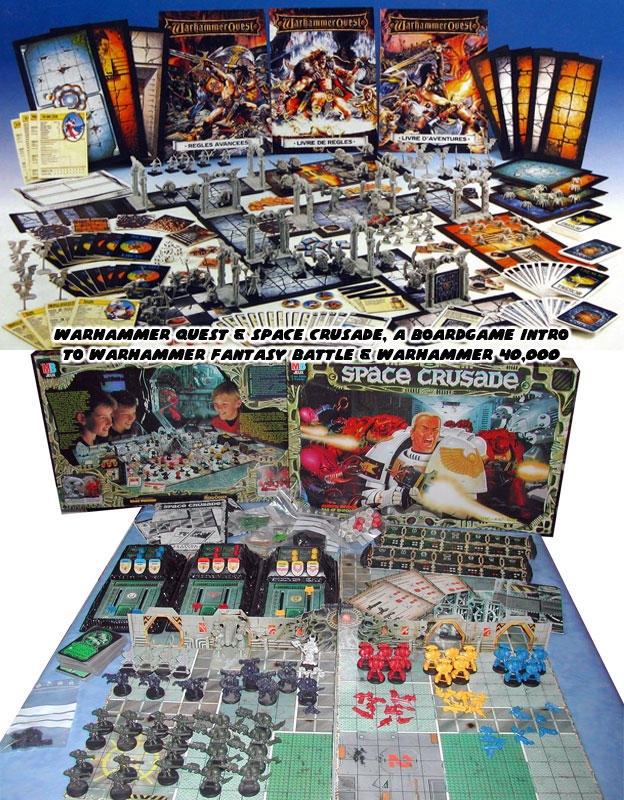
In 1995 the partnership with Milton Bradley ended. Games Workshop released Warhammer Quest as the spiritual successor to HeroQuest. The love of the system never completely died. To many it was the first real tabletop RPG they had ever played. The same thing could be said of Space Hulk. Sadly Space Crusade didn't capture the imagination of the public as well as Space Hulk did. The market for tabletop games would rise and fall over the next two decades. Part of the reason was due to the success of home consoles and the decline of the arcade game. The best tabletop systems kept coming back, they evolved with the trends. In the previous blog I highlighted how Space Hulk returned as a collectable card game. As mobile games exploded in popularity Space Hulk managed to return in the new format.

Warhammer 40,000: Deathwatch Tyranid Invasion was developed by Rodeo Games. It could be considered a spiritual successor to Space Hulk. In the game the audience could lead a squad of Space Marines against the Tyranids. The players would visit strange and exotic worlds and take part in skirmishes opposite the alien hordes. Troop movement was controlled with a traditional grid. It showed the ranges that each player could advance, where they could take aim and find spots to defend as well. Audiences on the go could control their troops with ease on a touch screen. Best of all, unlike the home systems a mobile device allowed audiences to pause in the middle of an encounter and resume the fight later on. There were many things to unlock, including weapons, relics and new Space Marine Chapters. This added tremendous replay value to the title.
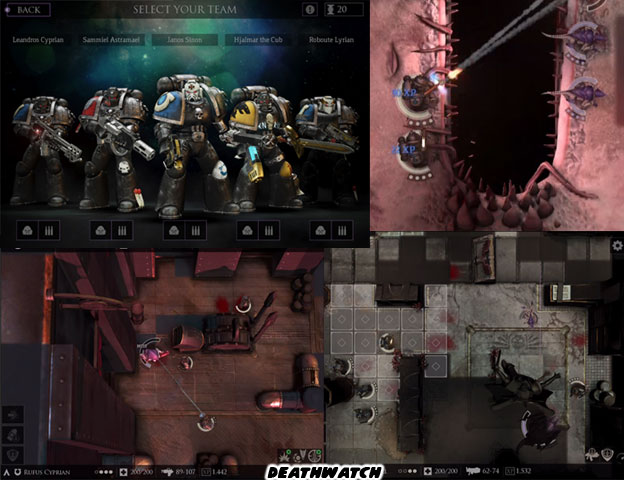
Rodeo Games even adapted Warhammer Quest for mobile devices and the PC via Steam. In order to keep the hobby alive Games Workshop needed to find new publishing partners. Instead of going after Milton Bradley the studio was recruiting some of the top video game and mobile developers. THQ, Relic, Pixel Toys and Rodeo Games were some of the studios helping get more eyes on the Warhammer universe and they were doing a fantastic job. If my friends and the visitors reading the blog are curious about tabletop gaming but don't know where to begin then I would actually start with some of the mobile games. There are many mobile titles to choose from but some of the best I haven't even gotten to yet. We'll start talking about them on the next blog. As always if you enjoyed this blog and would like to sponsor me please visit my Patreon page and consider donating each month, even as little as $1 would help make better blogs and even podcasts!
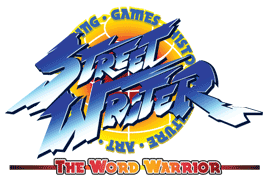
No comments:
Post a Comment